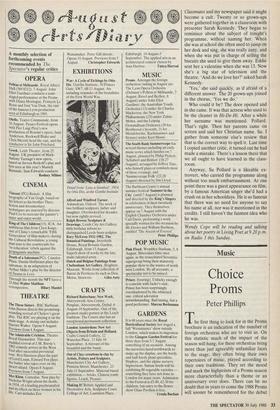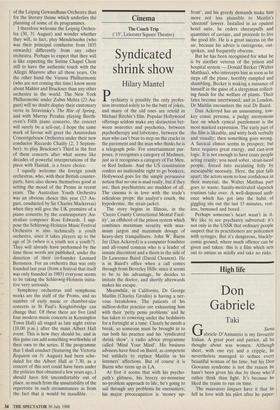Mu sic
Choice Proms
Peter Phillips
The first thing to look for in the Proms brochure is an indication of the number of foreign orchestras who are to visit us. On this statistic much of the impact of the season will hang; for these orchestras bring more than just agreeably unfamiliar faces to the stage, they often bring their own repertoires of music, played according to their own traditions. They set the mood and mark the highpoints of a Proms season more characterfully than a theme or an anniversary ever does. There can be no doubt that in years to come the 1988 Proms will sooner be remembered for the debut of the Leipzig Gewandhaus Orchestra than for the literary theme which underlies the planning of some of its programmes.
I therefore welcome the Leipzig Orches- tra (30, 31 August) and wonder whether they will, in fact, play Mendelssohn (who was their principal conductor from 1835 onwards) differently from any other orchestra. Perhaps to expect that they will is like expecting the Sistine Chapel Choir still to have the authentic touch with the Allegri Miserere after all these years. On the other hand the Vienna Philharmonic (who are not coming this time) know more about Mahler and Bruckner than any other orchestra in the world. The New York Philharmonic under Zubin Mehta (23 Au- gust) will no doubt display their customary verve in Stravinsky's The Rite of Spring, and with Murray Perahia playing Beeth- oven's Fifth piano concerto, the concert will surely be a sell-out. I hope the same mark of favour will greet the Amsterdam Concertgebouw Orchestra under their new conductor Riccardo Chailly (2, 3 Septem- ber): to play Bruckner's Third in the first of these concerts after what seems like decades of powerful interpretations of the piece with Haitink, is a brave choice.
I equally welcome the foreign youth orchestras, who, with their British counter- parts, have also shown themselves good at setting the mood of the Proms in recent years. The Australian Youth Orchestra was an obvious choice this year (13 Au- gust, conducted by Sir Charles Mackerras) when they will give the UK premiere of a piano concerto by the contemporary Au- stralian composer Ross Edwards. I sup- pose the Schleswig-Holstein Music Festival Orchestra is also technically a youth orchestra, since it takes players up to the age of 26 (when is a youth not a youth?). They will already have performed by the time these words are published, under the direction of their co-founder Leonard Bernstein. For an orchestra that was only founded last year (from a festival that itself was only founded in 1985) everyone seems to be taking the Schleswig-Holstein initia- tive very seriously.
Symphony orchestras and symphonic works are the stuff of the Proms, and no number of early music or chamber-size concerts in St Paul's Knightsbridge can change that. Of these there are five (and four modern music concerts in Kensington Town Hall) all staged as late night extras (10.00 p.m.) after the main Albert Hall event. This is how they should be, and in this guise can add something worthwhile of their own to the series. If the programme that I shall conduct (featuring the Victoria Requiem on 31 August) had been sche- duled for the Albert Hall at 7.30, as a concert of this sort could have been under the policies that obtained a few years ago, I should have felt uncomfortably out of place, as much from the unsuitability of the repertoire in such circumstances as from the fact that it would be inaudible.















































 Previous page
Previous page